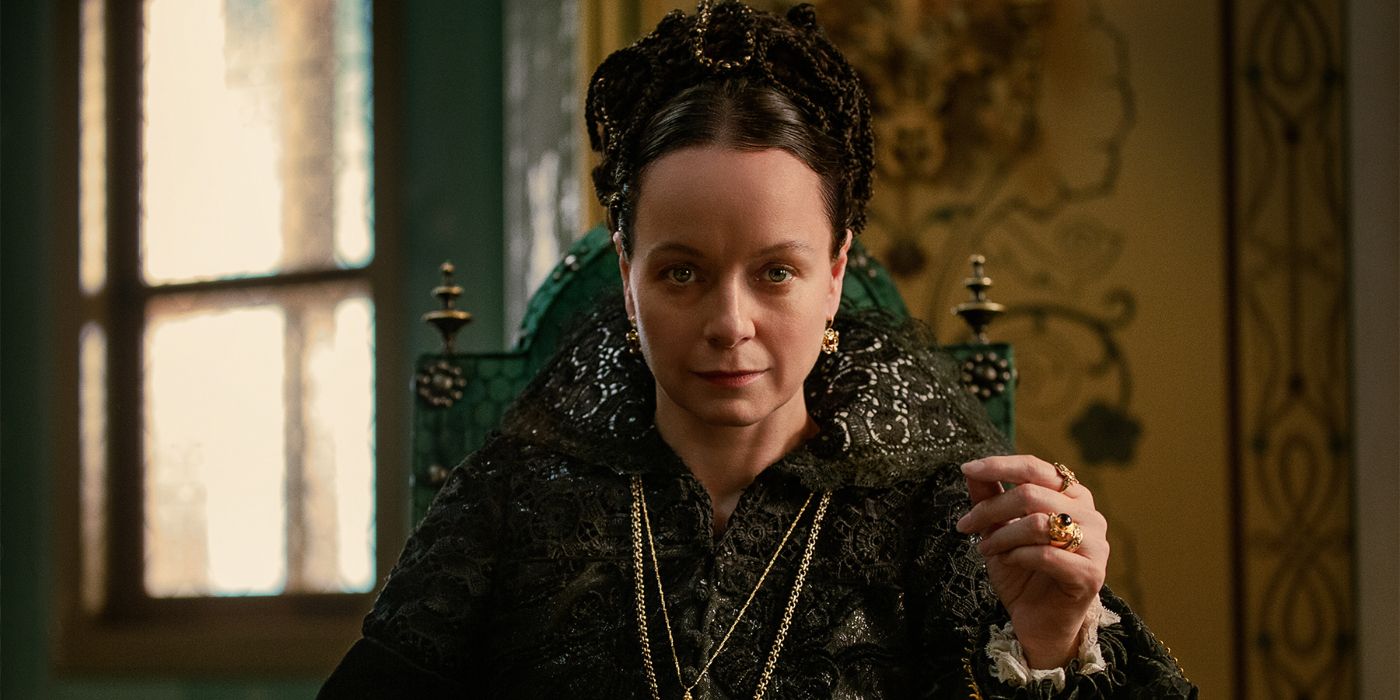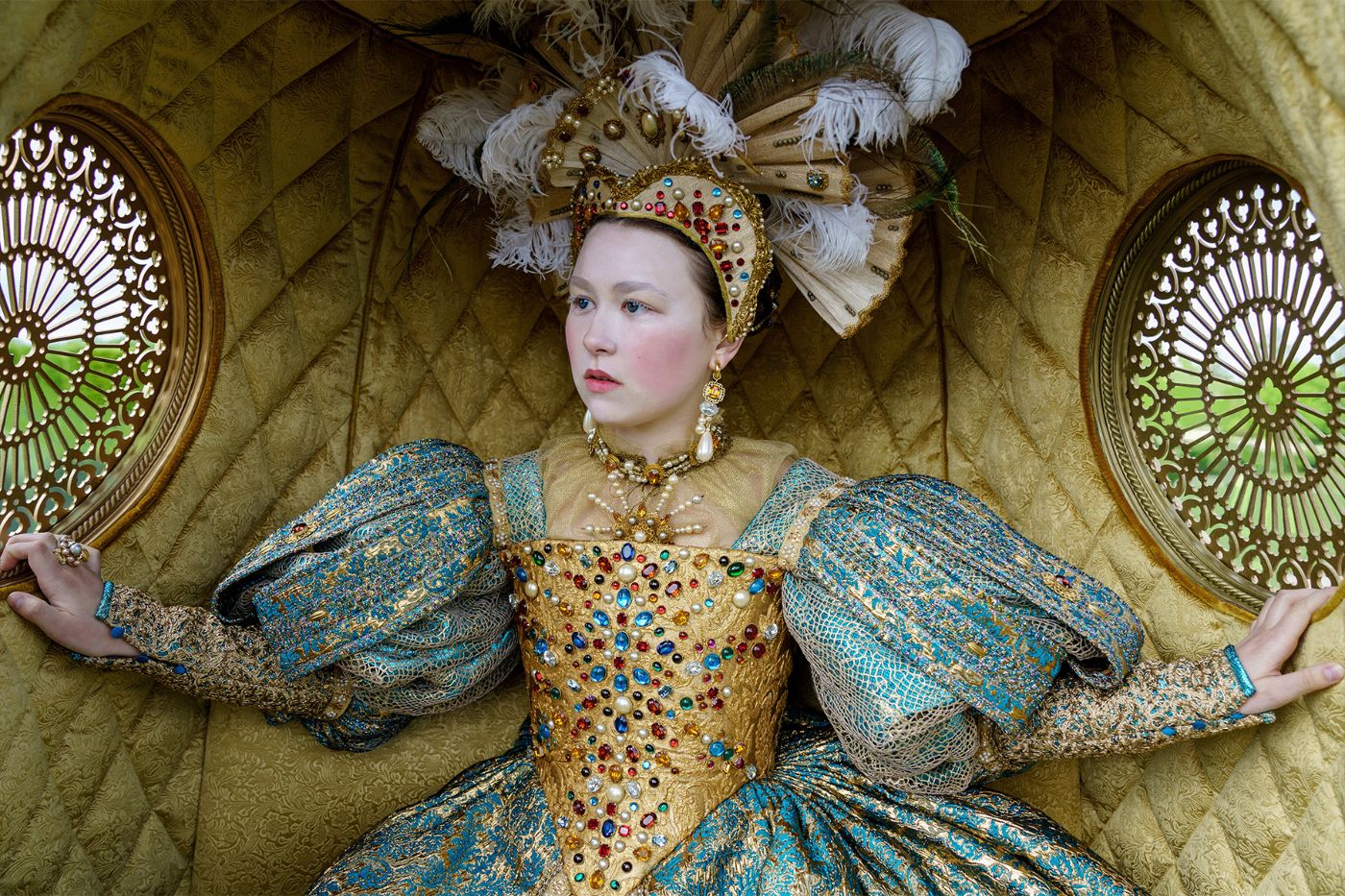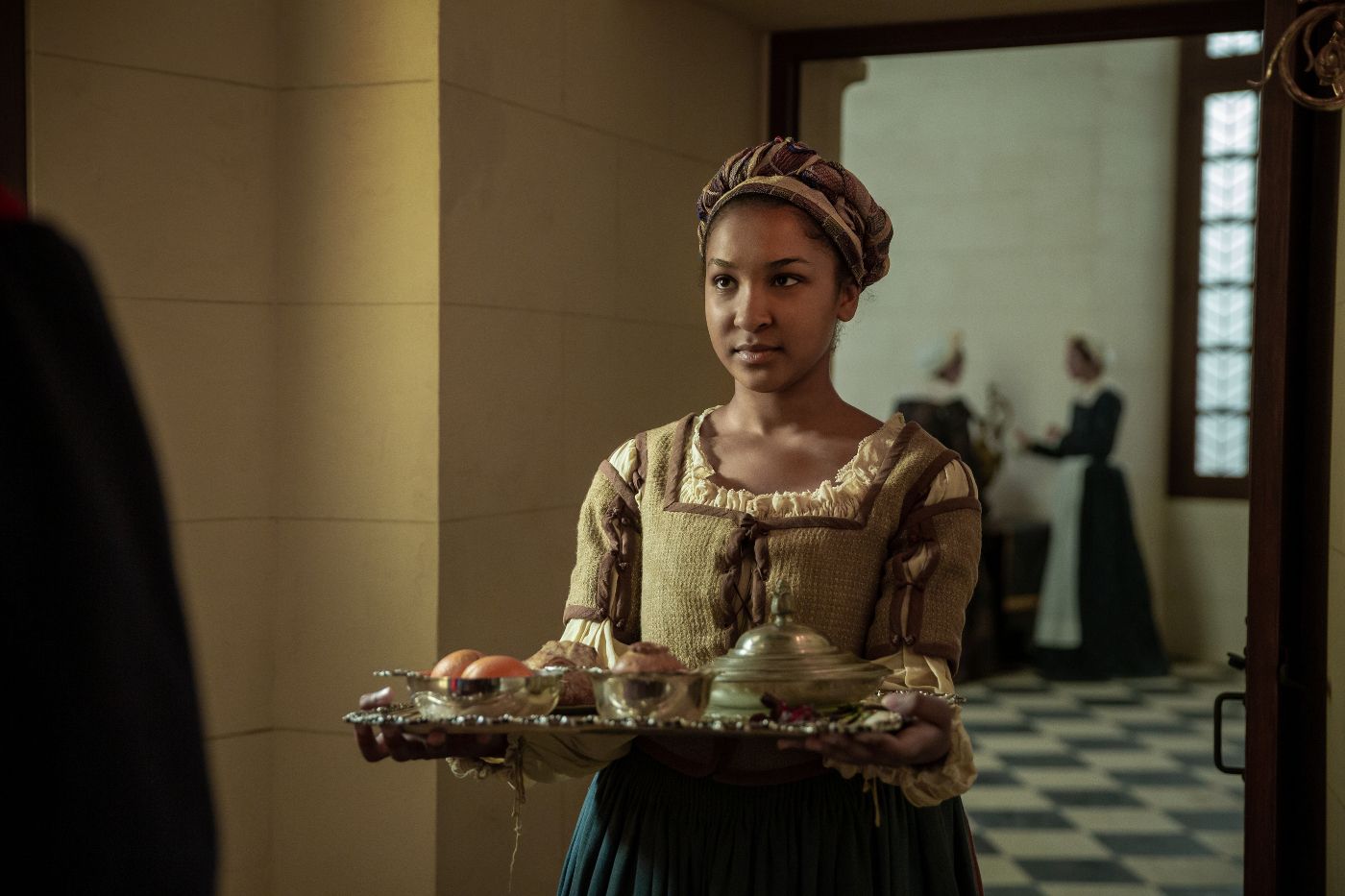When contemplating the experience of watching the first five episodes of The Serpent Queen, the newest period drama from Starz, there is one undeniable takeaway: Samantha Morton is a perfect Catherine de Medici. Though some may remember her for her villainous turn as Alpha in The Walking Dead, she has always had a strong command of the screen from Synecdoche, New York to her Oscar-nominated work in In America and Sweet and Lowdown. While this latest role doesn’t make full use of her talents, it is still wonderful to see her sink her teeth into the character and all the complexities to be found therein.
Based on the 2004 non-fiction book Catherine de Medici: Renaissance Queen of France by Leonie Frieda, the series actually pick up with someone other than the famed Italian noblewoman. A servant named Rahima, played by the spectacular Sennia Nanua of The Girl with All the Gifts, is going about her days when she gets called to provide services to Catherine. Clearly intimidated by the prospect of meeting her, she still proceeds ahead with a strong will of her own that will end up impressing the ruler. In the process, Rahima finds herself listening in on the story of how Catherine rose to power in the 16th century. Initially just a framing device to get into flashbacks that dominate the early episodes, it soon becomes a separate storyline; Rahima grows and changes when taken under the wing of the Queen of France. It does take a while to get there, and there is a lot of background that the show takes its time with, but it all ends up connecting back in intriguing ways. As Catherine’s past echoes into her future, the suffocating sense of peril becomes gradually more piercing as well. For those who know the history, this story does not end well for almost anyone involved in it.
Before all that, we get to see Catherine growing up in rather challenging circumstances. This younger version is played by an outstanding Liv Hill, who remains just as wonderful as she was in her 2018 feature debut Jellyfish. She brings necessary humor to the casual horrors that are inflicted on her. For every indignity she must endure, she gets a jab in. There is also a tragedy to it, as the person she once was is going to be broken down by the time she reaches adulthood. Early on, she gets married off by her uncaring uncle Pope Clement (Charles Dance) to French royalty after living as an orphan. It is a major change though Hill is riveting in revealing how Catherine is cunning enough to carve out an existence for herself where she can. The odds are often stacked against her, and she must think quickly in each situation. In every scene, there is the risk that she could be banished, ensuring there is no margin for error. However, in many ways, Catherine has a leg-up on the French royalty. Whereas they have lived sheltered lives that are oblivious to the real struggles beyond the castle grounds, she is familiar with what it takes to survive in a harsh world. This is all narrated by Morton, who brings both wisdom and wit to every single word she utters.
Sprinkled throughout these scenes is a recurring, though thankfully not overused, breaking of the fourth wall. When Catherine gives a knowing glance to the camera to punctuate particular moments, it creates a more playful sensibility to the sinister nature of what is taking place. While there is always a possibility that such asides could wear thin, they all end up working here because they are used sparingly. It ensures that the withering looks that Catherine gives remain sharp throughout, always capable of ratcheting up the tension and drama. Of course, even as she finds occasional triumphs amidst tragedy, there is the looming sense that her victory might only spell further destruction.
The show sets out to immerse itself in the political machinations of the kingdom à la House of the Dragon, though without the same obsession with legacy and tradition that dominate that fantasy show. Don’t let it be mistaken, there is plenty of brutality in The Serpent Queen. One particular scene where Catherine decides to sacrifice a member of her entourage is a gruesome one in how it is carried out. What distinguishes it is how simple it is, both in terms of its staging and significance. Whereas other stories about royalty play out as epics, full of brutal battles and bloody spectacle, this one is more narrowly focused. This isn’t a negative by any means as it opens up more potential to explore character. Most every scene of war happens largely off-screen, with the story told through Catherine’s eyes as she must fight a battle of her own elsewhere. The show is at its best when she begins to grow as a character and find a way to create a life for herself in a world that is always tenuous for her to navigate.
Conversely, the show is at its worst in some of the ways it is shot. While the sets are all serviceable and the costumes appropriate, the way the camera captures all this leaves something to be desired. Early on, there is a moment where it zooms in ever so slightly on a character. It was odd when it first happened, though it passed soon enough that it could be overlooked. Unfortunately, this starts to happen more and more frequently in a way that breaks the immersion of the scene. To zoom in with a camera is to call attention to its presence and is part of a visual language that is more common in certain sitcoms. Thus, when it happens here, it shatters the sense that we are in this world and teeters dangerously close to being unintentionally funny. This may seem like a small thing to focus on, but the way stories are brought to life via the camera is one of the most fundamental parts of any experience. Everything we see is contingent upon how the camera was operated and what it thought important to highlight. While certain establishing shots that feel more purposeful in how they use zooms are fine, to use it so haphazardly in key scenes never stops feeling strange. It is as if the camera operator, in the moment, decided we needed a greater close-up. There are glimpses of it in the exaggerated trailer that, while being mostly nothing like the show, still strikes an odd tone.
What pulls The Serpent Queen all together is the strength of its cast. While there is some initial disappointment in the show taking its time to get to more of Morton's performance in terms of the narrative, Hill more than puts that to rest. If anything, by the time the younger actor steps back, there is a sense of loss that we won’t get to see much of her in the story beyond that. This is absolutely intentional, as the show is centrally about how the innocence of childhood being lost was partly what molded Catherine, and that is meant to hurt. When Morton then takes center stage, you can see just how cold she has now become. From the manner in which she holds us in her gaze to the straightforward way she gives commands, it soon becomes apparent that she is capable of just about anything. The show is even bold enough to dip its toe into the occult, something lifted from some scattered parts of history, though it doesn’t quite leap all the way in within the first five episodes.
Regardless, the spell that Morton casts on-screen remains quite mesmerizing. In spite of some hiccups here and there, it is she who remains resolute. As we see Catherine grow and change, Morton is the one that guides us through all of the story’s challenges with ease. When making the most of her performance and the character study it creates, The Serpent Queen proves to be more than worth getting wrapped up in, with the story only luring us in — much like the snake in its title.
Rating: B
You can watch the first episode of The Serpent Queen starting September 11 on Starz, with the remaining seven episodes released weekly.



